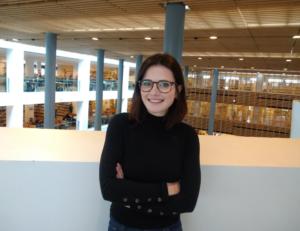 I arrived at the Center for Subjectivity Research at the beginning of February 2020 to develop a specific part of my PhD project, whose aim is to observe the relationship between the oriented framework of the Lifeworld and the development of a specific Form of Life. In my research at the University of Padova, I assume the lifeworld dimension to be a horizonal and oriented one, in which the constitution of a specific form of life could be seen as one of its possible determinations. The elements characterizing this specific formation are different, among them: language use, mutual perception and shared norms. However, in my project I’m focusing in particular on language acquisition, language use and mutual understanding. For this purpose, I aim at renewing the debate around a possible dialogue between Edmund Husserl and Ludwig Wittgenstein, considering primarily their late production. My goal is not to directly compare the two thinkers or to show any influence of Husserlian phenomenology on Wittgenstein’s philosophy – since we have neither biographical nor textual evidence to affirm that. Instead, what I do is to observe in which extend a combined discussion of some instances of the two philosophers could give us a deep insight on specific problems related to intersubjective practices.
I arrived at the Center for Subjectivity Research at the beginning of February 2020 to develop a specific part of my PhD project, whose aim is to observe the relationship between the oriented framework of the Lifeworld and the development of a specific Form of Life. In my research at the University of Padova, I assume the lifeworld dimension to be a horizonal and oriented one, in which the constitution of a specific form of life could be seen as one of its possible determinations. The elements characterizing this specific formation are different, among them: language use, mutual perception and shared norms. However, in my project I’m focusing in particular on language acquisition, language use and mutual understanding. For this purpose, I aim at renewing the debate around a possible dialogue between Edmund Husserl and Ludwig Wittgenstein, considering primarily their late production. My goal is not to directly compare the two thinkers or to show any influence of Husserlian phenomenology on Wittgenstein’s philosophy – since we have neither biographical nor textual evidence to affirm that. Instead, what I do is to observe in which extend a combined discussion of some instances of the two philosophers could give us a deep insight on specific problems related to intersubjective practices.
I applied for a research stay at the CFS in order to investigate the essential role of communicative acts in the constitution of the Heimwelt and to observe the action of the feeling of familiarity in the establishment of the socio-communicative realm. What does it mean to feel familiar with a communicative context? Is familiarity a necessary and sufficient condition for the genesis of communicative acts? Is familiarity a feeling at all? If not, what is it? These are just some of the questions I was dealing with before arriving in Copenhagen. The participation and active contribution to the group’s research seminars gave me the essential tools to develop those problems. I worked on some of the limits of my approach, which combines phenomenology with notions from other research fields like linguistics and pragmatics and got useful advice from the center’s members.
I did not expect to be so involved in the numerous activities organized by the CFS: during my first month there, I had the chance to attend two international workshops, lecture groups and seminars and to take part in lively and interesting discussions during lunch time and coffee breaks. Maybe those moments turned out to be the ones I missed the most, when the pressure of the events related to the Covid-pandemic started. When thinking about my research stay at the Center for Subjectivity Research, I can’t avoid considering how fast the circumstances we live in can change. On the flight from Italy to Denmark, I was already regretting the choice of having applied just for a three-month research stay. Can three months be long enough to collect some relevant experiences? Oh yes, they do! And they actually did.
All in all, I spent almost four, wonderful months at the Center. Well, I’m not sure I can say that I actually “spent” my time physically there and it’s quite easy to understand why. The University of Copenhagen closed on the 12th of March and the Danish lockdown phase started: from one day to another I found myself alone in my apartment in Amager and with my thoughts directed towards my family and friends in Italy. Closed borders, no flights… I must admit I could not imagine spending my research stay in this way.
The most incredible thing about it is that, despite all the circumstances, I actually enjoyed this experience until the last day. The Center started carrying on the research activities online and I got a lot of virtual support and help from the CFS members. I prolonged my stay in order to find some flights and I even had the chance to meet physically with a couple of colleagues to say them goodbye before going back to Italy. Once back, I felt I was missing that place. Strange to say, after such a short time! I believe the experience in Copenhagen showed me the relevance of sharing, a relevance I used to overlook before: sharing my work, thoughts and even troubles with people changed my way of approaching academic research and I feel genuinely grateful for that.
After all, three months can go fast – as they did – but they can be extremely intense.